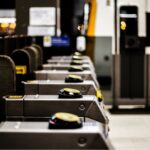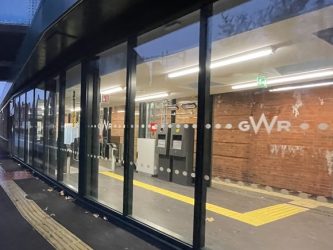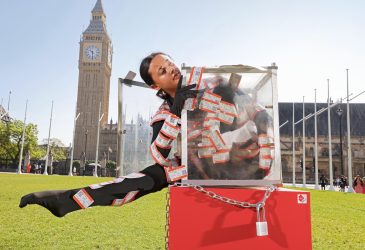Thousands more passengers will benefit from simpler, more flexible travel from next year, under new pilot schemes confirmed by the Rail Minister today (1 February).
Stations across the West Midlands and selected routes in Greater Manchester are set to be fitted with technology allowing people to simply tap-in and tap-out of their local network knowing they will pay the best fare – meaning no need to plan ahead or search for the right ticket.
The project is part of the Government’s plans to reform the railways, while also delivering on Trailblazer devolution deals aimed at giving local leaders a bigger say in how the network is run.
These trials will also pave the way for the future roll-out of similar technology to more stations across the North and Midlands, funded in part by £100 million reallocated from HS2, enabling the further rollout of such technology in more places.
Rail Minister Huw Merriman said: “We want to encourage more people back onto our trains, with tap-in technology meaning using our stations couldn’t be easier.
“Our railways have a long history, but projects like these – part of the Government’s wider plans for reform – will ensure they have a bright future too.”
The West Midlands pilot is planned to cover 75 stations across the Transport for West Midlands (TfWM) area (including five currently under construction), and use existing ‘Swift’ smartcards, meaning passengers can travel seamlessly on local bus and tram services as well.
Greater Manchester’s pilot scheme is planned to include 17 stations on the Glossop-Manchester Piccadilly and Stalybridge-Victoria lines. It will use contactless bank cards and devices, and will support the wider ambition to deliver full multi-modal fares and ticketing integration across bus, Metrolink, rail and cycle hire as part of the Bee Network by 2030.
In preparing the pilots, the Department for Transport, Great British Railways Transition Team (GBRTT) and Rail Delivery Group (RDG) have worked closely with TfWM, the West Midlands Rail Executive, Transport for Greater Manchester and train operators. Work will continue to finalise plans for the pilots ahead of launch in 2025.
Meanwhile, work being led by GBRTT on the development of new regional partnerships with Transport for West Midlands and Transport for Greater Manchester is also underway, to help more towns and cities across the country benefit from greater local decision-making on local ticketing, services and stations. Separately, the Transport Secretary and Rail Minister met with regional Mayors on Wednesday to discuss their proposals for alternative rail connections between Birmingham and Manchester.
Andy Street, Mayor of the West Midlands, said: “Our Swift smartcard already enables passengers to transfer seamlessly between our various local bus operators and Metro tram services whilst guaranteeing they get best value fares.
“Now thanks to this pilot scheme, we will now add rail to our offering – making Swift truly multi-modal and bringing us much closer to a London ‘Oyster card’ style system.
“This is a practical example of how the Deeper Devolution Deal we agreed with Government is delivering tangible benefits for local people right across our region.”
Stewart Fox-Mills, Director for Fares, Ticketing and Retail at GBRTT said: “Buying a train ticket is often too complicated. Which is why work to simplify the experience customers have is such a vital part of wider rail reforms.
“Partnership working, bringing the railway together to work with local partners, has unlocked pilots that will deliver a more seamless travel experience for customers in the West Midlands and Greater Manchester. GBRTT will continue to work with partners to deliver a more locally accountable, integrated rail network.”
With plans already in motion for industry to expand Pay As You Go in the South East later this year, the pilot stations confirmed today will see the total number of tap-in-tap-out stations in England surge to around 500 in 2025.
The news comes as the Rail Delivery Group and industry partners – supported by £16.4 million DfT funding – completed the final phase of rolling out barcoding technology, which allows customers to scan digital tickets at the gate. As a result, passengers at every station in Great Britain (outside devolved Merseyrail and TfL) will have greater flexibility around how they buy train tickets.
Jacqueline Starr, Chief Executive of Rail Delivery Group, said: “We’re glad the rail industry has made it easier for customers to travel on a digital barcode ticket across the National Rail network by completing the rollout of barcode scanners on gatelines.
“We are also proud to support the Pay As You Go pilots in Greater Manchester and West Midlands. This is another significant step in making fares and ticketing easier for everyone.”
Other recent milestones on the rail reform agenda include the launch of LNER’s Simpler Fares pilot following the roll-out of Single Leg pricing on its network, while the Government will be bringing forward a draft Bill this Parliamentary session on Great British Railways for pre-legislative scrutiny.


